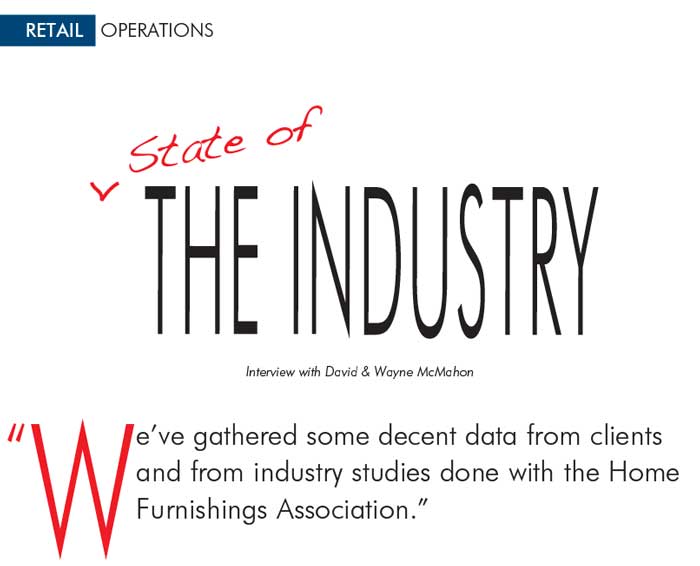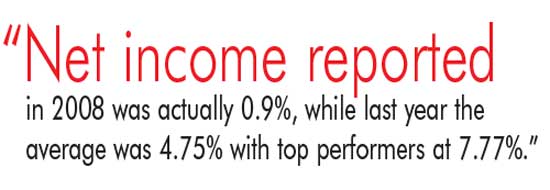
Furniture World caught up with retail operational and financial advisers, David and Wayne McMahon of PROFITconsulting, just ahead of their Kaizen peer performance group meeting.
David is a popular editorial contributor to Furniture World Magazine. (All of his articles can be found in one place at
https://www.furninfo.com/Authors/List.)
The father/son team answered a few questions about the state of the industry, where it might be going and how retailers can navigate change in the near and long term.
Question: Performance-wise what results have you seen with retailers and the industry as a whole?
Wayne: “We’ve gathered some decent data from our clients and from industry studies done with the Home Furnishings Association. Last year we brought back the Retail Performance Report which hadn’t been published since 2008. There have been some interesting changes.”
David: “Here are a few instances where there have been significant improvements. Between 2008 and 2015, gross margin has grown from 45% to 47% on average, whereas top performers have grown to 51%. Net income in 2008 was actually reported as under 0.9% while last year the average was 4.75%, with top performers at 7.77%.
“We also saw a one-year sales growth in the industry of 5.6% on average and over 15% for the top retail performers.
“Average sale has had a big increase since 2008, going from $1,100 to $1,517 in 2015. The top 20% of performers we follow had $2,193 average sale!
“The last one I’ll mention is GMROI. Back in 2008 it was reported at $2.28. Last year our industry study found retailers produced $2.62 while the top 20% reported over $3.13. A 34 cent increase in GMROI equates to $340,000 gross margin dollars for an operation with $1 million in inventory, so the increase between 2008 and 2015 is significant.

“We studied many other industry metrics but these are some highlights. Overall retailers seem to be performing better and better.”
Question: Why have the metrics improved?
David: “I think it has to do with a combination of factors. Retailers are becoming more educated, they have dedicated industry partners, they have quicker access to data, they know how to measure, and they know how to adjust their tactics to make improvements. The best out there are learning from others. The strong are becoming stronger, and weaker operations are going away.
“Performance differences among retailers tend to be regional during recessions, as well as during times like right now where there’s low unemployment. Depending on where a retail operation is, the challenges it faces, and how it is running its business, I have seen over 20% growth and 20% decline. These performance differences were largely affected by how each operation adjusted its strategy, considering local economic and competitive factors. Overall there are a lot of challenges, but I would advise any retailer to just focus on their specific situation, whatever part of the world they are in.”
Question: What are the most important advancements our industry is experiencing?
Wayne: “Probably the greatest advancements are in the sphere of marketing. The internet has led to an enormous amount of both competition as well as opportunities for retailer’s to communicate with customers in multiple, highly efficient and measurable ways.”
David: “We have seen advancements on the technical side in every business area. For example, integration has advanced among the various software systems through the cloud. Independent and isolated systems are starting to talk to each other. You now have integrated POS systems, marketing systems, accounting systems, delivery management and CRM systems. They are all tied into retail sites, vendor sites, and web-media sites. Everything is becoming more integrated in order to help businesses meet the high expectations of today’s connected consumer. I see this trend continuing to advance with integration becoming easier, cheaper and more seamless. On the way to the future, we will see inflexible products go away, and new, adaptive and dynamic technologies emerge. As I mentioned, things are becoming faster. People are experiencing information overload. Time is becoming the most valuable resource. Technologies and methods to capture potential and existing customers’ time will be a growth area.”
Question: What are the most successful retailers doing?
Wayne: “The most successful retailers have been able, through nurturing, to obtain and develop exceptional employees throughout all areas of their businesses - whether it be sales, administration or distribution. Those exceptional employees are the reason why successful businesses have been able to prosper.”
David: “Yes, finding good people is probably the number one challenge retailers talk about. Those that can overcome this challenge will generally get ahead of their competition.
“The best retailers provide an atmosphere where good people want to work. I believe that people attract people like themselves. So, if you want a fun, energetic, hardworking, results oriented atmosphere, you need to get people with those types of attitudes, train them in your products and services and remove those who do not share the same attitude. You need your business to drive the top line and attain high margins in order to attract, develop and keep employees.
“Also, the businesses that are getting ahead of the competition are the ones that measure where they are today and try to make themselves better day-in and day-out. These are the kinds of retailers that join performance groups. They engage with others to get insight, to look at and grow their businesses. They are believers in training and development. They don’t sit still. Those that do sit still are the ones who will continue to have trouble.”
Wayne: “Correct. Those successful retailers are always looking for ways to advance. Continual improvement in business operations leads to success.”
Question: What are the warning signs, the canaries in the mines so to speak that Furniture World readers should be on the lookout for?
Wayne: “Certainly there are many challenges that negatively affect retailers. Some of the warning signs can be a reduction in traffic, a decline in sales, failure to retain good people, or lack of control over key expenses and excess inventory.”
David: “When a company has a decline in sales volume, management must pause and ask if it is really a problem or a symptom of a bigger issue? A decline in sales is never the whole story. Retailing is complex. Aside from external factors, just about any area of a business can impact sales.
“Organizations need to simultaneously grow their top-line and their margins. Lack of growth, declining margins and volume always mean trouble. You cannot operate a business successfully in the current retail reality by cutting expenses. That just doesn’t work. Operations need to be LEAN, but that doesn’t mean they should be cheap. It is necessary to spend money to grow. Dollars should be invested in carefully considered ways that translate into growth, and those dollars come from being consistently profitable and keeping inventory, in the proper proportion to sales volume.
“A declining topline and sluggish margins with inventory that is either rising or staying the same, means that cash flow issues will follow shortly.”
Question: Do you have some recommended solutions to those challenges? How can retail owners and managers stay ahead of the curve?
Wayne: “Companies experiencing declining sales and so on, should look to the sales equation. Pay attention to verified traffic coming through the door. Look at traffic conversion, average sales and the root causes of declines. Then take the right steps to fix them fast! Retailers need to summon the courage to realize gross margins that are necessary to support a business and generate a profit. The metrics need to be in place to ensure they have quality inventory that is not excessive. Under no circumstance can merchandise be allowed to sit in stock, aging and not producing any return on investment.”
David: “Retailers need to consistently check the pulse of their businesses. Reviewing key performance indicators and business processes is not something that should be done in response to some chaotic event. Avoid a culture of chaos management at all costs.
“Managers who see a consistent downward trend or stagnation in some performance measure, need to dig into it. When a retailer says, ‘My sales are up’ or ‘my sales are down’, that really means little, because it’s the ‘Why’ that matters most. It is hard to fix or replicate a hunch. What caused an upturn or downturn is what’s important, and once real reasons are known, actions can be executed to improve results.
“For example, if cash flow is declining while sales and margins remain decent, it might be discovered that inventory to sales is rising. And, with further digging in, it may be seen that dogs are not going out faster than new merchandise is being received. The solution might be to improve the markdown system, implement a better open to buy and flow best sellers.
“Doing nothing, or not even realizing that there is opportunity for corrective action, is what causes many businesses to unknowingly underachieve.”
Question: Any final words of advice for our readers?
Wayne: “In the 25 years that I have been involved with the retail home furnishings industry, family-owned businesses have faced increasing competitive challenges from top 100 stores. Many independents experienced difficult issues during the recession, and those who did not innovate and adapt, declined or disappeared. Strong independents, however, have grown in both sales and profitability. There has also been significant changes with the growth of manufacturer-sponsored, franchise-type operations. Certainly the most successful of these has been the Ashley HomeStores.
“To reiterate, management should always be looking to improve. The art of continual, ongoing and never-ending improvement in the business leads to success. This has been proven time and time again. We encourage businesses to follow that approach religiously.”
David: “Yes I agree. Technology-wise, we’ve seen the rapid growth of the internet, ERP systems, the flow of information and the cloud. People are now completely wired in. Society has seemingly become faster. That has been a big shift. The companies that are doing well are meeting the challenges of keeping up with changes in technology, supply chain management and in society.
“To add to this, It is important that independent business people know that they are not in it alone. Don’t isolate yourself. There are a lot of smart and experienced people out there. Seek to leverage knowledge from others, whether it be peer stores, industry associations, or professional consultants who serve to help others in your industry.”